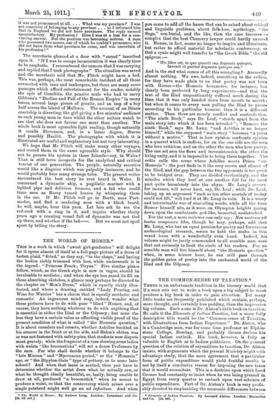THE WORLD OF HOMER.*
Tins is a work in -which "sweet girl-graduates" will delight for it opens almost of itself at a full-page picture of a dress of tartan plaid, "fitted," as they say, "to the shape," and having the bodice richly trimmed with lace, while underneath it is the legend : "Princess Frock ; Tiryns." Five similar plates follow, which, as the Greek style is now in vogue, should be invaluable to modistes ; and when the eye has gazed its fill on these absorbing sketches, a glance may perhaps be directed to the chapter on "Men's Dress," which is equally richly illus- trated, and where a drawing entitled "Lady Pouring out Wine for Warrior" has a charm that is equally aesthetic and romantic. An ingenuous mind may, indeed, wonder what these pictures have to do with poor " blind" Homer, and, of course, they have nothing whatever to do with anything that is essential in either the Iliad or the Odyssey ; but none the less they have a certain value as affording visible proof of the present condition of what is called " the Homeric question." It is about corselets and corsets, whether Achilles buckled on his armour in the front or at the side, and Helen's chiton was or was not fastened with safety-pins, that students now dispute most gravely; while the fragment of a vase showing some ladies with waists "like broomsticks" will set a dozen Professors by, the ears. For, who shall decide whether it belongs to the "late Minoan" and " Mycenaean period," or the " Homeric " age, or " the Dipylon-Gate " type of pottery, or to some later school P And when that issue is settled, then you have to determine whether the artist drew what he actually saw, or what he thought ideally beautiful, or, lastly, being unable to draw at all, produced "a broomstick" when he meant to produce a waist, so that the controversy which arises over a single potsherd might well go on ad infinitum. And when • The World of Homer. By Andrew Lang. London: Longuians and Co. [68. 6d. net.3
you come to add all the !Banes that can be raised about critical and linguistic problems, about folk-lore, mythology, " the Saga," urn-burial, and the like, then the case becomes so complex that the beat Chancery lawyer could hardly unravel it Homer, in fact, seems no longer to inspire and illuminate, but rather to afford material for scholastic controversy, so that a cynic might well transfer to "the Greek Bible " the old epigram :-- " Hie fiber est, in quo quaerit sna dogmata quisque, Invenit et pariter dogmata quisque sus."
And in the end what comes of all this wrangling P Assuredly almost nothing. We owe, indeed, something to the critics, for they have made plain to us that poetry was not born with Homer—the Homeric hexameter, for instance, has clearly been perfected by long experiments—and that the text of the Mad unquestionably suffered much during the time that it was only handed down from mouth to month; but when it comes to every man pulling the Iliad to pieces according to his particular humour, then it is a different matter. Then there are merely conflict and contradiction. "The ninth Book," says Dr. Leaf, "stands apart from the main story into which it has been intruded " ; " Remove the ninth Book," says Mr. Lang, "and Achilles is no longer himself," while the supposed " main story " becomes " a poem without a motive." That is how opinion confronts opinion in a quarrel which is endless, for on the one side are the men who love criticism, and on the other the men who love poetry. The one set sees the flaws and inconsistencies, the other the living unity, and it is impossible to bring them together. The critic calls the scene where Achilles meets Priam " un- Homeric ": the poet finds in it the very crown and climax of the Iliad, and the gap between the two opponents is too great to be bridged over. They are divided everlastingly, and the missiles which they hurl at one another fall for the most part quite harmlessly into the abyss. Mr. Lang's arrows for instance, will never hurt, say, Dr. Leaf ; while Dr. Leaf, taking up an argument "such as ten other mortals of to-day could not lift," will hurl it at Mr. Lang in vain. It is a weary and interminable war of unavailing words, while all the time Homer himself sits, as it were, on Olympian heights gazing down upon the combatants, god-like, immortal, undisturbed.
For the rest, a mere reviewer can only say : Non nostrum eat tantas componere litea, though he may, perhaps, add that Mr. Lang, who has an equal passion for poetry and for curious archaeological research, seems to hold the scales in this vexed issue with a wonderfully even hand. Indeed, his volume might be justly commended to all sensible men, were that not seriously to limit the circle of his readers. For no sensible man will fret himself about "the Homeric question" when, in some leisure hour, he can still pass through the golden gates of poetry into the enchanted world of the Iliad and the Odyssey.










































 Previous page
Previous page